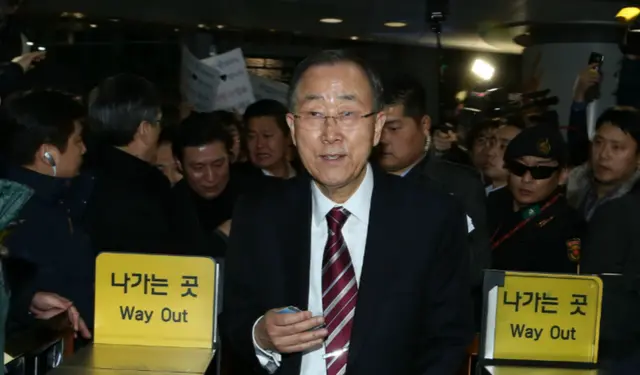Former UN chief Ban Ki-moon's unexpected renunciation of his presidential bid in South Korea may benefit Prime Minister Hwang Kyo-ahn, who is serving as acting president following the impeachment of President Park Geun-hye.
In the absence of any proper candidate from the ruling Saenuri Party, Ban has long been viewed as the best hope among conservative voters in an early presidential election, which is widely forecast to be held in April or May.
Ban, however, held an unscheduled press conference in the parliament Wednesday, saying he will give up his pure will to lead his home country's political change as his intention was distorted by media reports and slanders.
Ban's drop on his run for presidency embarrassed the political sphere as the newcomer showed no signs and did normal activities until right before the emergency press briefing. He met with key politicians earlier in the day and discussed political affairs.
Ban's abrupt renunciation may benefit Prime Minister Hwang, who recently emerged as an alternative to replace the impeached leader amid the lack of probable contenders in the conservative camp.
According to local newspaper Segye Ilbo's poll released Tuesday, the top post was held by Moon Jae-in, former head of the biggest opposition Minjoo Party who garnered 32.8 percent in approval scores.
While Ban's approval rating tumbled to 13.1 percent, support scores for Hwang advanced to 8.3 percent following the lunar New Year's holiday and moved to the fifth place.
Conservative voters, who may be disappointed at Ban's emotional response to journalists and media speculations about his involvement in bribery, may have chosen to support Hwang rather than the career diplomat who came back to his homeland three weeks ago.
The Saenuri Party's interim chairman said on Tuesday that the approval scores Hwang gained reflect hopes among conservative voters for his run for presidency. Hwang hasn't denied his presidential bid, opening the possibility for his official declaration.
Hwang's approval rating may rise further as he can absorb the support that was given to the former UN secretary general. His role as a caretaker president can help raise his brand awareness among the general public.
The upward momentum, however, would be restricted as Hwang served President Park as the prime minister and the justice minister. It would be hard for him to avoid responsibility for the presidential impeachment.
Instead, the lost support for Ban can move to Ahn Hee-jung, the governor of South Chungcheong province, who is affiliated with the main opposition Minjoo Party but has the same political support base as Ban's.
Ahn's support scores as the next South Korean leader advanced to the fourth place with 9.1 percent, according to the Segye Ilbo survey. It followed 10.5 percent won by Lee Jae-myung, mayor of Seongnam city to the southeast of Seoul who is also affiliated with the Minjoo Party.
Regardless of who gains the lost support from Ban's drop on presidency, the powerful contender's disappearance in the conservative bloc raises the possibility for the transfer of presidential power to the main opposition party.
The Minjoo Party has top three presidential hopefuls, including Moon, Lee and Ahn. After the party's primary, the winner will highly likely combine the divided support for the opposition camp.
(APD)
 简体中文
简体中文







